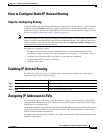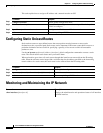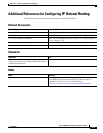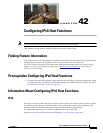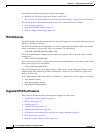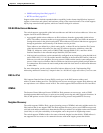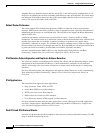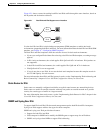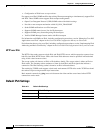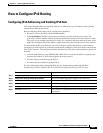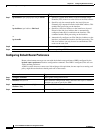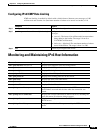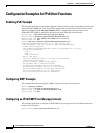
42-5
Cisco IE 2000 Switch Software Configuration Guide
OL-25866-01
Chapter 42 Configuring IPv6 Host Functions
Information About Configuring IPv6 Host Functions
Figure 42-1 shows a router forwarding both IPv4 and IPv6 traffic through the same interface, based on
the IP packet and destination addresses.
Figure 42-1 Dual IPv4 and IPv6 Support on an Interface
Use the dual IPv4 and IPv6 switch database management (SDM) template to enable dual-stack
environments (supporting both IPv4 and IPv6). For more information about the dual IPv4 and IPv6 SDM
template, see
Chapter 11, “Configuring SDM Templates.”
The dual IPv4 and IPv6 templates allow the switch to be used in dual-stack environments.
• If you try to configure IPv6 without first selecting a dual IPv4 and IPv6 template, a warning message
appears.
• In IPv4-only environments, the switch applies IPv4 QoS and ACLs in hardware. IPv6 packets are
not supported.
• In dual IPv4 and IPv6 environments, the switch applies IPv4 QoS and ACLs in hardware.
• IPv6 QoS and ACLs are not supported.
• If you do not plan to use IPv6, do not use the dual-stack template because this template results in
less TCAM capacity for each resource.
For more information about IPv4 and IPv6 protocol stacks, see the “Implementing IPv6 Addressing and
Basic Connectivity” chapter of Cisco IOS IPv6 Configuration Library on Cisco.com.
Static Routes for IPv6
Static routes are manually configured and define an explicit route between two networking devices.
Static routes are useful for smaller networks with only one path to an outside network or to provide
security for certain types of traffic in a larger network.
For more information about static routes, see the “Implementing Static Routes for IPv6” chapter in the
Cisco IOS IPv6 Configuration Library on Cisco.com.
SNMP and Syslog Over IPv6
To support both IPv4 and IPv6, IPv6 network management requires both IPv6 and IPv4 transports.
Syslog over IPv6 supports address data types for these transports.
SNMP and syslog over IPv6 provide these features:
• Support for both IPv4 and IPv6
• IPv6 transport for SNMP and to modify the SNMP agent to support traps for an IPv6 host
• SNMP- and syslog-related MIBs to support IPv6 addressing
122379
3ffe:yyyy::1
10.1.1.1
IPv6
IPv4



